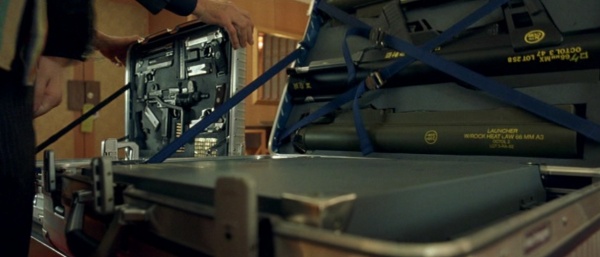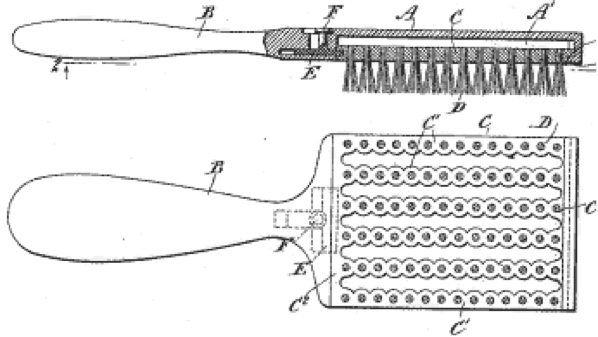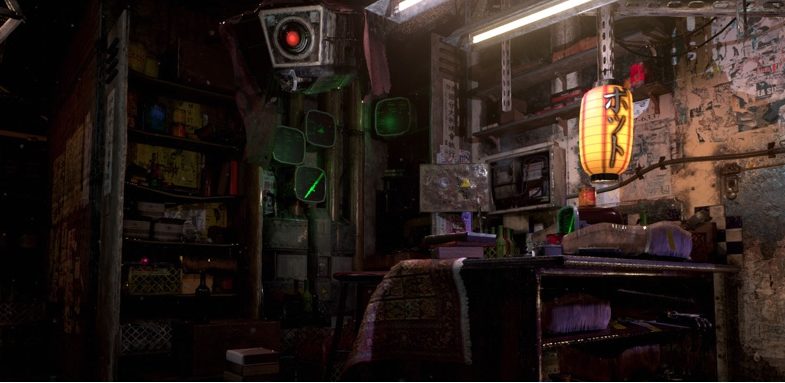STEPPING
by Bryan Cole
The elevator whirred almost imperceptibly as it glided up the side of the skyscraper. Hatcher looked out the window and down into the concrete sea, its ripples of lanes and streets and avenues punctuated by the reef-like structures of the arcologies and the tight clusters of office buildings.
“Fella has a nice view from up here I’ll bet,” he mused to the grizzled survivor next to him.
“Yeah. This guy’s kind always has a nice view.” Dragon too, although he wouldn’t admit it, still took in the view of the city of Madrid with some mix of awe and remorse. He knew all too well what was happening far below, and his profit and traffic in it sometimes gave him pause.
But not too often.
“Welcome to the 87th floor,” the elevator announced. “please enjoy your stay!”
The guy was slick. They might have pulled him out of a tanker spill for all Hatcher knew. From the comfortable way the guy shook the hand attached to Hatcher’s augmented arm to the way he scanned Hatcher and Dragon to see if they were carrying, this guy knew enough that he wouldn’t be alone. But would it be prudent to question him on that observation? He was a pro at whatever one would call this particular niche of business.
“Dupont. Haven’t heard much about you lately. Not since Vienna, at any rate.” Dragon obviously knew something about the slick.
“Well, you know how those things go. Rumors still travel faster than the newsfeeds, least in these parts.” DuPont answered. “This your friend?” He pointed towards Hatcher.
“One and the same.” Dragon replied.
DuPont pulled two suitcases out from under the bed in the room. That was another indicator of quality. The bed in this room, in addition to its king-size stature, was also fixed in place. It even had posts and what were probably thousands of creds worth of pillows and cases and sheets on it. Then again, to have a room this far up the hotel was wealth beyond Hatcher’s imagination. He could only guess what the Presidential Suites at the very top must look like.
“Mind if I…?” Hatcher tentatively inquired, making a slight motion towards the cases.
DuPont backed up a few steps. “Please do.”
Even the suitcases were ridiculous. Real leather, by the smell of it, and triple-stitched. Not those vat-grown cows that the value-branded stores tried to pass off as the original item. These suitcases were, by virtue of their craftsmanship, already worth more than the hardware they carried. The fact that they were probably kevlar lined with internal frames that could withstand the abuse of even the most aggressive baggage handler was just additional testament to their worth. Hatcher carefully unzipped them both before flipping the covers back simultaneously.
It was the first time he had even thought of the word ‘Christmas’ in many, many months.
The Malorian Arms 3516, chambered in 14mm, was so powerful that right from those first fateful sketches on the drawing board it had been assumed that the wielder would be augmented. When you consider that a .50 bullet is a half-an-inch in size, then convert that to metric, you find that the fifty is equivalent to about 12.7 millimeters. This 14mm monstrosity, like it’s smaller .50 cousin, could stop most vehicles with a well-placed shot. The built-in smartlink was just icing on the cake. Hatcher would never admit it to anyone, but sometimes he had disabled the smartlink just to make shooting the gun feel more like the plinking he had done while growing up on his family’s farm. He twirled the gun around a few times before it hit him that DuPont had obviously known what was in the case, and therefore had probably anticipated that Hatcher would have the cybernetic arm. He caught himself smirking.
“Everything okay?” DuPont asked.
“Oh yeah, this is exactly as I remember it. Can’t believe you got ahold of one so easily.”
“Don’t assume anything is easy.”
Hatcher nodded, feeling temporarily chastised for his eagerness. He moved over to look in the other suitcase.
The Militech Ronin assault rife was more standard issue fare. Although classified as light due to its caliber and modular build, it still had an amazing amount of accessories and configurations that could be added or created. This made it capable of fulfilling roles ranging from a simple under-the-coat submachine gun to a portable sniping platform to a battlefield rifle capable of firing grenades. It was precisely this “grab-bag” of adaptability that made it the preferred weapon of the 504th when Hatcher had deployed with them, and had seen him choose it again and again over the years for various duties. The rifle frame, barrel, bipod, and receiver could all easily fit into a briefcase. The extra room in DuPont’s suitcase was filled with a variety of goodies and accessories that would allow it to cover the wide range of responsibilities for which the weapon was capable. Hatcher picked up the one thing he didn’t recognize and held it before DuPont.
“Rifle grenade?” He asked, deducing some functionality from the shape.
“Close. That’s an Israeli modification. Created during the Final Intifada. This baby here is for clearing rooms. The pineapple packaging is actually about two dozen small cubes packed into the warhead. Once it is launched and impacts something, the cubes are ejected from the warhead. You can also set it to disperse at any height that the weapon can reach.”
Hatcher had heard about it. The Final Intifada. After almost 80 years of not being in their homeland, the Palestinians had been worked into a frenzy by some nutbag or the other, and had gone in against the Israelis tooth and nail. It had become the new definition of guerrilla conflict, displacing the still horrid descriptions of Stalingrad, Berlin, and Poland from the Second World War. Children, mothers, dogs, everyone had fought in the FI. By the time outside countries had intervened it was chaos, there was no discernible social order or sides that anyone could tell. The military precision of the Israelis had been the only winner. And even then there were rumors that it had taken a few weeks before they would calm down enough to even talk to the relief agencies.
Hatcher stared at the death he held in his hand.
“Each packs a solid explosive that in turn is embedded with fragmenting devices. You can either set them to behave like fragmenting mines, or they can be set to explode on impact. This thing caused quite the stir.”
Hatcher’s expression spoke volumes to DuPont. “Geneva Convention revised the rules on this and about a hundred other things after the FI.”
“So why is it sitting in the suitcase?”
“Free sample.”
Hatcher turned to look at Dragon, now well past his ability to control his expression. This guy DuPont was definitely of the soft-sale variety. Dragon stifled his chuckle but not his expression. “Lookin’ good there, Ace?”
“Yeah, man. All the ‘i’s and ‘t’s are dotted and crossed.” Hatcher ran his real hand across the lining of one of the suitcases.
Dragon finally moved from the spot he had been standing in since Hatcher had opened the suitcases. He shook hands with DuPont, who then shook hands with Hatcher. Hatcher quietly secured the purchased weapons into the carry-bag he had brought and then the two veterans left the apartment. No reference was made to payment or amount; those sorts of bickerings were the fruit of back-alley deals and pulp novels. People like DuPont dealt in numbered accounts based upon trust.
It was the only civilized way to conduct oneself.


























